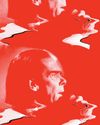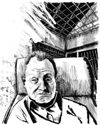WeWork thinks it’s optimized the workplace for creativity and productivity. Has it?

IN MARCH 2017, the New York City–based editors and writers of The Atlantic moved to a WeWork office in Brooklyn. I remember our first morning vividly: It was like entering the Millennial id. Craft beer and cucumber water poured from kitchen taps. Laptoppers in jeans and toques clacked along to MGMT in the wood-paneled common area. A WeWork “community manager” showed us to a glass-walled office so small that my colleagues and I could clasp hands while seated. We sat. Had we arrived in the future of work?
The Atlantic told us this arrangement would be temporary while our real office was renovated. As of this writing, we’re still here. If We Work had its way, we’d stay forever, along with much of the 21st century workforce.
WeWork is the world’s leading co- working company and the sixth-most-valuable start-up, according to VentureSource. Last year it was valued at $20 billion, a staggering sum for a company renting out short-term office space, mostly to small businesses and free lancers. But like Uber and Airbnb, WeWork positions itself grandly, as a disruptive revolutionary. It promises to “humanize” work, making the office a more creative place, with the right lighting, the right snacks, and, crucially, the right people.
WeWork would say it’s well on its way to transforming white-collar labor: It seats 175,000 “members” in 207 locations across 20 countries, with plans to double in size this year. Its leaders describe it not as a real-estate venture but as a “community company.”
Denne historien er fra March 2018-utgaven av The Atlantic.
Start din 7-dagers gratis prøveperiode på Magzter GOLD for å få tilgang til tusenvis av utvalgte premiumhistorier og 9000+ magasiner og aviser.
Allerede abonnent ? Logg på
Denne historien er fra March 2018-utgaven av The Atlantic.
Start din 7-dagers gratis prøveperiode på Magzter GOLD for å få tilgang til tusenvis av utvalgte premiumhistorier og 9000+ magasiner og aviser.
Allerede abonnent? Logg på

The Dark Origins of Impressionism
How the violence and deprivation of war inspired light-filled masterpieces

The Magic Mountain Saved My Life
When I was young and adrift, Thomas Manns novel gave me a sense of purpose. Today, its vision is startlingly relevant.

The Weirdest Hit in History
How Handel's Messiah became Western music's first classic

Culture Critics
Nick Cave Wants to Be Good \"I was just a nasty little guy.\"

ONE FOR THE ROAD
What I ate growing up with the Grateful Dead

Teaching Lucy
She was a superstar of American education. Then she was blamed for the country's literacy crisis. Can Lucy Calkins reclaim her good name?

A BOXER ON DEATH ROW
Iwao Hakamada spent an unprecedented five decades awaiting execution. Each day he woke up unsure whether it would be his last.

HOW THE IVY LEAGUE BROKE AMERICA
THE MERITOCRACY ISN'T WORKING. WE NEED SOMETHING NEW.

Against Type
How Jimmy O Yang became a main character

DISPATCHES
HOW TO BUILD A PALESTINIAN STATE There's still a way.